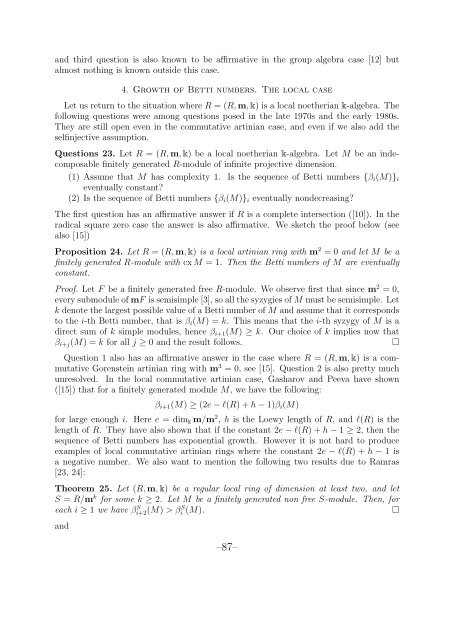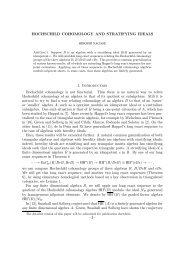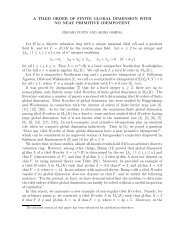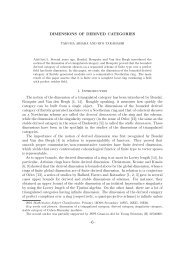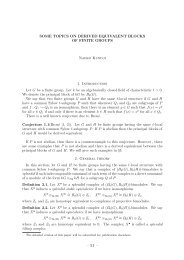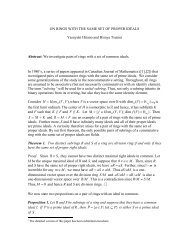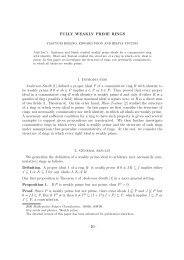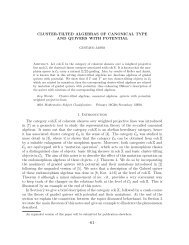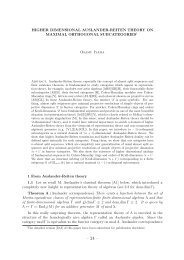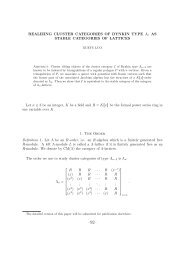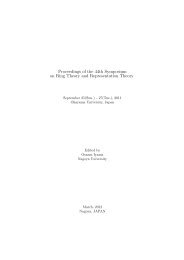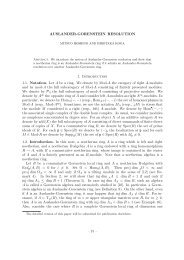Proceedings of the 44th Symposium on Ring Theory and ...
Proceedings of the 44th Symposium on Ring Theory and ...
Proceedings of the 44th Symposium on Ring Theory and ...
You also want an ePaper? Increase the reach of your titles
YUMPU automatically turns print PDFs into web optimized ePapers that Google loves.
<strong>and</strong> third questi<strong>on</strong> is also known to be affirmative in <str<strong>on</strong>g>the</str<strong>on</strong>g> group algebra case [12] but<br />
almost nothing is known outside this case.<br />
4. Growth <str<strong>on</strong>g>of</str<strong>on</strong>g> Betti numbers. The local case<br />
Let us return to <str<strong>on</strong>g>the</str<strong>on</strong>g> situati<strong>on</strong> where R = (R, m, k) is a local noe<str<strong>on</strong>g>the</str<strong>on</strong>g>rian k-algebra. The<br />
following questi<strong>on</strong>s were am<strong>on</strong>g questi<strong>on</strong>s posed in <str<strong>on</strong>g>the</str<strong>on</strong>g> late 1970s <strong>and</strong> <str<strong>on</strong>g>the</str<strong>on</strong>g> early 1980s.<br />
They are still open even in <str<strong>on</strong>g>the</str<strong>on</strong>g> commutative artinian case, <strong>and</strong> even if we also add <str<strong>on</strong>g>the</str<strong>on</strong>g><br />
selfinjective assumpti<strong>on</strong>.<br />
Questi<strong>on</strong>s 23. Let R = (R, m, k) be a local noe<str<strong>on</strong>g>the</str<strong>on</strong>g>rian k-algebra. Let M be an indecomposable<br />
finitely generated R-module <str<strong>on</strong>g>of</str<strong>on</strong>g> infinite projective dimensi<strong>on</strong>.<br />
(1) Assume that M has complexity 1. Is <str<strong>on</strong>g>the</str<strong>on</strong>g> sequence <str<strong>on</strong>g>of</str<strong>on</strong>g> Betti numbers {β i (M)} i<br />
eventually c<strong>on</strong>stant?<br />
(2) Is <str<strong>on</strong>g>the</str<strong>on</strong>g> sequence <str<strong>on</strong>g>of</str<strong>on</strong>g> Betti numbers {β i (M)} i eventually n<strong>on</strong>decreasing?<br />
The first questi<strong>on</strong> has an affirmative answer if R is a complete intersecti<strong>on</strong> ([10]). In <str<strong>on</strong>g>the</str<strong>on</strong>g><br />
radical square zero case <str<strong>on</strong>g>the</str<strong>on</strong>g> answer is also affirmative. We sketch <str<strong>on</strong>g>the</str<strong>on</strong>g> pro<str<strong>on</strong>g>of</str<strong>on</strong>g> below (see<br />
also [15])<br />
Propositi<strong>on</strong> 24. Let R = (R, m, k) is a local artinian ring with m 2 = 0 <strong>and</strong> let M be a<br />
finitely generated R-module with cx M = 1. Then <str<strong>on</strong>g>the</str<strong>on</strong>g> Betti numbers <str<strong>on</strong>g>of</str<strong>on</strong>g> M are eventually<br />
c<strong>on</strong>stant.<br />
Pro<str<strong>on</strong>g>of</str<strong>on</strong>g>. Let F be a finitely generated free R-module. We observe first that since m 2 = 0,<br />
every submodule <str<strong>on</strong>g>of</str<strong>on</strong>g> mF is semisimple [3], so all <str<strong>on</strong>g>the</str<strong>on</strong>g> syzygies <str<strong>on</strong>g>of</str<strong>on</strong>g> M must be semisimple. Let<br />
k denote <str<strong>on</strong>g>the</str<strong>on</strong>g> largest possible value <str<strong>on</strong>g>of</str<strong>on</strong>g> a Betti number <str<strong>on</strong>g>of</str<strong>on</strong>g> M <strong>and</strong> assume that it corresp<strong>on</strong>ds<br />
to <str<strong>on</strong>g>the</str<strong>on</strong>g> i-th Betti number, that is β i (M) = k. This means that <str<strong>on</strong>g>the</str<strong>on</strong>g> i-th syzygy <str<strong>on</strong>g>of</str<strong>on</strong>g> M is a<br />
direct sum <str<strong>on</strong>g>of</str<strong>on</strong>g> k simple modules, hence β i+1 (M) ≥ k. Our choice <str<strong>on</strong>g>of</str<strong>on</strong>g> k implies now that<br />
β i+j (M) = k for all j ≥ 0 <strong>and</strong> <str<strong>on</strong>g>the</str<strong>on</strong>g> result follows.<br />
□<br />
Questi<strong>on</strong> 1 also has an affirmative answer in <str<strong>on</strong>g>the</str<strong>on</strong>g> case where R = (R, m, k) is a commutative<br />
Gorenstein artinian ring with m 3 = 0, see [15]. Questi<strong>on</strong> 2 is also pretty much<br />
unresolved. In <str<strong>on</strong>g>the</str<strong>on</strong>g> local commutative artinian case, Gasharov <strong>and</strong> Peeva have shown<br />
([15]) that for a finitely generated module M, we have <str<strong>on</strong>g>the</str<strong>on</strong>g> following:<br />
β i+1 (M) ≥ (2e − l(R) + h − 1)β i (M)<br />
for large enough i. Here e = dim k m/m 2 , h is <str<strong>on</strong>g>the</str<strong>on</strong>g> Loewy length <str<strong>on</strong>g>of</str<strong>on</strong>g> R, <strong>and</strong> l(R) is <str<strong>on</strong>g>the</str<strong>on</strong>g><br />
length <str<strong>on</strong>g>of</str<strong>on</strong>g> R. They have also shown that if <str<strong>on</strong>g>the</str<strong>on</strong>g> c<strong>on</strong>stant 2e − l(R) + h − 1 ≥ 2, <str<strong>on</strong>g>the</str<strong>on</strong>g>n <str<strong>on</strong>g>the</str<strong>on</strong>g><br />
sequence <str<strong>on</strong>g>of</str<strong>on</strong>g> Betti numbers has exp<strong>on</strong>ential growth. However it is not hard to produce<br />
examples <str<strong>on</strong>g>of</str<strong>on</strong>g> local commutative artinian rings where <str<strong>on</strong>g>the</str<strong>on</strong>g> c<strong>on</strong>stant 2e − l(R) + h − 1 is<br />
a negative number. We also want to menti<strong>on</strong> <str<strong>on</strong>g>the</str<strong>on</strong>g> following two results due to Ramras<br />
[23, 24]:<br />
Theorem 25. Let (R, m, k) be a regular local ring <str<strong>on</strong>g>of</str<strong>on</strong>g> dimensi<strong>on</strong> at least two, <strong>and</strong> let<br />
S = R/m k for some k ≥ 2. Let M be a finitely generated n<strong>on</strong> free S-module. Then, for<br />
each i ≥ 1 we have βi+2(M) S > βi S (M).<br />
□<br />
<strong>and</strong><br />
–87–


